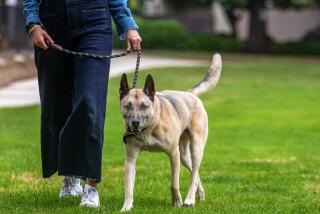And an iPod will never play fetch
- Share via
What is it with people and their dogs these days?
There always have been devoted dogs and grateful, loving owners -- or, er, human companions. But something qualitatively new has come over this relationship. If you are older than, say, 35, you can’t miss it. People are looking for a whole lot more in their dogs than they used to. And they’re finding it.
I’m not talking about emotional-support dogs joining seeing-eye dogs on airplanes or the proliferation of dog shrinks, dog parks and dog gyms. These are just expressions of a need that people have come to feel more intensely over the last 20 years, a need that dogs are uniquely equipped to satisfy (cats being, as we all know, different): the need for an innocent relationship.
It’s true that dogs always have been celebrated for their innocence. But the primary meaning of “innocence” was traditionally associated with virtue and vice, candor and deceit, fidelity and treachery. Only secondarily did it connote transparency, by which I mean an utter absence of reflexivity, an absence of self-image. Unlike you and me, dogs never obsess about their appearance or dwell on petty revenge fantasies. They are free from all that.
Nowadays, that second kind of innocence is what people see in their dogs, and it is something in which they invest enormous value for reasons they may only be dimly aware of. The innocence of dogs is contagious, you see. It seeps into your relationship with a dog.
It seeps into you.
What a relief! Because in this mediated age, our lives are saturated with representations that stimulate self-awareness -- with images and descriptions of ourselves, everyone we know and everything that matters to us, everything we were, everything we could be or should be. All the possibilities and actualities of being in the world are constantly before us. Media constitute our environment, from family photos as screensavers to each word and picture on every vertical surface in the city.
“Saturation” is the right word because it implies absorption, and that’s where the effects of mediation take hold. It’s not just the environment. Our minds are stocked with media entities too. Run the numbers. How many “things” in your mind are derived from media compared with, say, your great-grandfather? Ask yourself this: Is there anything you do that remains essentially unmediated, anything you don’t experience reflexively through some representation of it?
Think of all the movies and memoirs, philosophies and techniques, self-help books, blogs, chat rooms, counselors, programs, workshops. Think of all the vocabularies that are generated in these venues and that sweep through the culture, implanting in our grammar the categories we use to process our experience. Ask yourself: If I were to strip away these influences, could I even conceive of my life?
The answer is no, clearly. Except for the fortunate few -- the dog people. If you are a dog person, you enjoy a significant degree of freedom from all these intruding representations. Not because the forces of mediation leave this aspect of your life alone; they are doing their best to co-opt it -- how long has “Marley & Me” been at the top of bestseller lists?
But these forces can’t really get inside your relationship with your dog. It doesn’t matter how much you read about dogs or chat online about dogs or post photos of your dog on personal pages -- your relationship with your dog could not be mediated even if you wanted it that way.
Why? Because your dog, thank the Lord, can’t participate in the process.
Try this. Try to show your dog a picture of himself. You might as well stick a copy of the Bill of Rights in front of his nose. Your dog doesn’t know what that picture is and doesn’t care -- and, at some level, you are redeemed by his indifference.
Your dog frees you from the relentless reflexivity that otherwise haunts your life in this mediated world. Above and beyond unflagging loyalty and affection, which are the most obvious gifts your dog brings to you; above and beyond the enthusiasm with which your dog greets you, or the way his features suffuse with expectation as -- leashed, perhaps, to a parking meter -- he waits for you to emerge from a store, waits for you and only you. For only you will do. The planet will not be balanced on its axis again until you return to his side.
But then, after a flurry of tail wagging and butt wiggling and ear flattening, how seamlessly your dog settles back into its normal groove, now that the natural order of things has been restored. No recriminations, no grudges, he trots beside you, or strains ahead at the leash -- all in accordance with the inclination of the individual and the breed -- sniffing at this and that, the past wiped away, the slate clean -- and the future doesn’t exist at all.
Your dog is always there in the moment, and you matter absolutely in its eyes. But beyond the simple transaction of affection that has always been essential to people’s relationships with dogs, there’s a new dimension. You cannot help but reciprocate their unconditional loyalty and affection -- and, in so doing, you stumble into innocence yourself.


